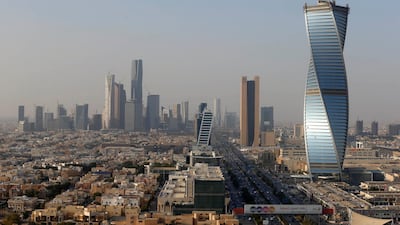Saudi Arabia has approved a new bankruptcy law, a move analysts predict will help attract foreign direct investment, boost credit growth and allow the country’s SME sector to thrive, as the process of unwinding insolvent companies becomes easier.
“The awaited Bankruptcy Law is the latest in structural developments in the kingdom's business legal framework and is part of the overall reform efforts, under Vision 2030, to further facilitate a healthy business environment that encourages participation by foreign and domestic investors, as well as, local small and medium enterprises,” the Saudi embassy in Washington said on its website.
The legislation includes general regulations, preventive actions, measures for financial restructuring, as well as, settlement procedures, the statement added. No indication was given as to when the new law would come into effect.
Saudi Arabia, the world’s biggest oil exporter, is revamping its economy under a roadmap called Vision 2030 to help lower the country’s dependence on oil, attract foreign investments and create jobs for Saudi citizens. The bankruptcy law, which has been in the works for years, is one of a raft of new laws expected to be adopted to help facilitate foreign and local investments in the economy, the region’s largest.
_______________
Read more:
Egypt's bankruptcy law is credit positive for banks
New bankruptcy law will draw investment, says DIFC Courts chief
_______________
The kingdom is following in the footsteps of the UAE, which approved a bankruptcy law in 2016 to help better deal with corporate insolvencies.
“Previously Saudi Arabia had no single bankruptcy law setting out procedures for businesses which get into financial trouble,” said Paul Latto, a Riyadh-based partner in international law firm DLA Piper.
“Existing laws were very antiquated and even starting proceedings could be very hard. This caused problems both for businesses and their creditors when a business found itself in difficulty as there wasn't a clear way of bringing everyone together and working out whether a business could be saved or should be liquidated.”
SMEs are expected to benefit the most from the law in Saudi Arabia, according to analysts.
“The idea is to simplify and institutionalise the process of going out of business so new organisations can come in,” said Usamah Al Kurdi, an economic analyst and former member member of the Shura Council, the formal advisory body to the Saudi government.
“The natural way of the economy is for small and medium-sized enterprises to go out of business every day and more companies go in every day. It is a continuous cycle.”
SMEs are the backbone of the economy in Saudi Arabia and the wider Arabian Gulf region, but have often struggled to attract credit from banks in tighter economic conditions.
The new law could whet the banks’ appetite again because there will be mechanisms to protect creditors, according to Mazen Al Sudairi, head of research at Al Rajhi Capital.
“Now the capability of lending to the private sector will increase and be enhanced, so the spread of risk will go down, and the segment to borrow will expand,” he said.
“Those who will benefit the most are the SMEs, they couldn’t borrow in the old days.”
The new bankruptcy law, devised in consultation with academics together with representatives from both the public and private sectors, will most probably be complemented with other regulations to ensure proper implementation.
“Bankruptcy laws take time to bed in, as we have seen in other countries,” said Mr Latto. “Expertise needs to be built up among insolvency practitioners. Implementing regulations and sector specific rules will need to follow.”

